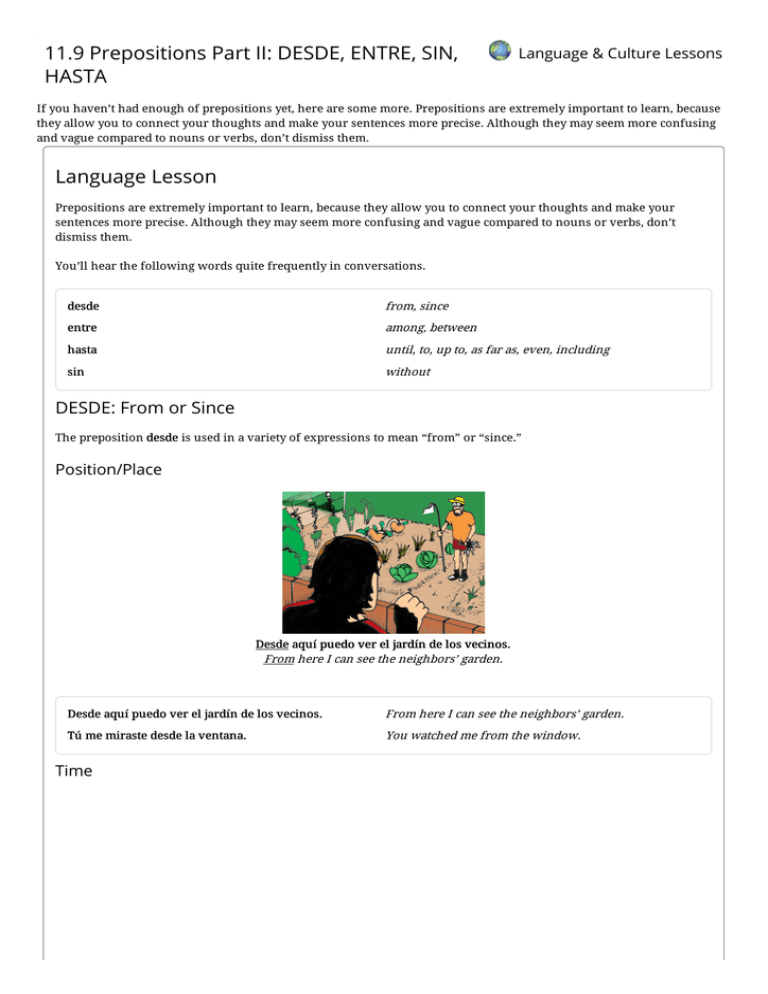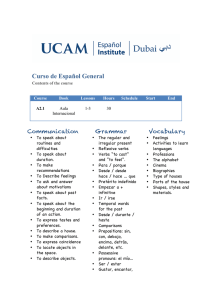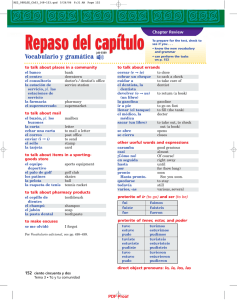11.9 Prepositions Part II: DESDE, ENTRE, SIN, HASTA Language
Anuncio

11.9 Prepositions Part II: DESDE, ENTRE, SIN, HASTA Language & Culture Lessons If you haven’t had enough of prepositions yet, here are some more. Prepositions are extremely important to learn, because they allow you to connect your thoughts and make your sentences more precise. Although they may seem more confusing and vague compared to nouns or verbs, don’t dismiss them. Language Lesson Prepositions are extremely important to learn, because they allow you to connect your thoughts and make your sentences more precise. Although they may seem more confusing and vague compared to nouns or verbs, don’t dismiss them. You’ll hear the following words quite frequently in conversations. desde from, since entre among, between hasta until, to, up to, as far as, even, including sin without DESDE: From or Since The preposition desde is used in a variety of expressions to mean “from” or “since.” Position/Place Desde aquí puedo ver el jardín de los vecinos. From here I can see the neighbors’ garden. Desde aquí puedo ver el jardín de los vecinos. From here I can see the neighbors’ garden. Tú me miraste desde la ventana. You watched me from the window. Time Estoy de régimen desde esta mañana. I’m on a diet from this morning on. I’m on a diet from this morning on. Estoy de régimen desde esta mañana. Vamos a comenzar el entrenamiento desde el lunes de la We’re going to start training from Monday of next week. próxima semana. It is also used in the following phrases: desde … hasta (from … to) The plane traveled from Peru to Chile. El avión viajó desde Perú hasta Chile. desde que… (since) I’ve lived here since I was born. He vivido aquí desde que nací. ¿desde cuándo? (how long?) ¿Desde cuándo lo sabes? How long have you known? Desde que lo leí en tu diario. Since I read it in your diary. HASTA: Until, Up to, As Far As, Even, Including Hasta is another all-around useful word that can mean everything from "until" to "including." You have already seen its use above, in the phrase desde … hasta (in which it means "to"). You've probably said it many times when waving goodbye to someone: ¡hasta luego! ¡hasta mañana! Here are some examples of other ways to use hasta. until ¡Hasta la muerte! Until death! ¡Hasta la muerte! Until death! Juan se va a quedar en Cuba hasta el fin de año. Juan will stay in Cuba until the end of the year. Hasta que aprendas todo, tienes que quedarte en casa. Until you learn everything, you have to stay at home. up to Llené el vaso hasta arriba. I filled the glass up to the top. Llené el vaso hasta arriba. I filled the glass up to the top. Algunas veces corro hasta una hora sin parar. Sometimes I run up to an hour with- out stopping. Puedes gastar hasta veinte dólares esta noche. You can spend up to twenty dollars tonight. as far as Los astronautas viajaron hasta el planeta Marte. The astronauts traveled as far as the planet Mars. Los astronautas viajaron hasta el planeta Marte. The astronauts traveled as far as the planet Mars. even Hasta María piensa que tu vestido nuevo es feo. Even María thinks that your new dress is ugly. Hasta María piensa que tu vestido nuevo es feo. Even María thinks that your new dress is ugly. ¡Hasta los vecinos escucharon lo que dijiste! Even the neighbors heard what you said! Hasta borracho Mario habla como abogado. Mario talks like a lawyer even when he’s drunk. including Comí hasta los huesos. I ate (everything), including the bones. I ate (everything), including the bones. Comí hasta los huesos. ENTRE: Among or Between You won’t have many problems with the preposition entre, which means among or between. Use it just as you would use its English equivalents. Por ejemplo: Levantaron el auto entre seis hombres. They picked up the car between six men. Levantaron el auto entre seis hombres. They picked up the car between six men. Tenemos dos mil pesos entre todos nosotros. We have two thousand pesos between all of us. Tienes que elegir entre estos tres libros. You have to choose among these three books. SIN: Without The word sin is usually followed by a noun, but you can also use it with the infinitive form of a verb. Por ejemplo: Diego quedó sin palabras. Diego was left without words. Los turistas llegaron al hotel sin dinero. The tourists arrived to the hotel without money. No puedo hacerlo sin ver las instrucciones. I can’t make it without looking at the instructions. Culture Banks in Latin America Banks have become globalized, and major cities in Latin America have branches of international banks, such as Citibank, the Swiss UBS or Deutsche Bank. Buenos Aires, Santiago, Rio de Janeiro, Lima and Mexico City are the financial capitals of the region. But don´t expect specialized customer service for overseas clients, because most of these branches are intended for local companies, and manage their investments overseas. Except for Citibank and Spanish banks, you won´t be able to cash a cheque at the Bank of America in Buenos Aires, or the Deutsche Bank in Chile. Most banks in Latin America are locally owned, with at least one state bank institution per country. These state banks are not for profit and are used as vehicles for social reform, providing services like: Low interest loans to city councils, schools and other social organizations Finance for buildings for low income earners who have an account with them These state-owned banks can be run as a private or public company, but the CEO has to be appointed by the government. As a tourist it might seem that there are too many state banks because of their names: like “Banco de Venezuela” or “Banco de Bogotá”. But don´t be fooled, most of the time these are private institutions that are controlled by international companies; they've just been given a local name. Libros Media Ltd. - Copyright 2004-2014 USA: 10660 Page Avenue, PO Box 1261, Fairfax, VA 22038, USA | Phone: 703-349-0452 Asia/Pacific: 2-1008 Ferry Road, Woolston, Christchurch 8023, New Zealand | Phone: +64-3-384-6350



